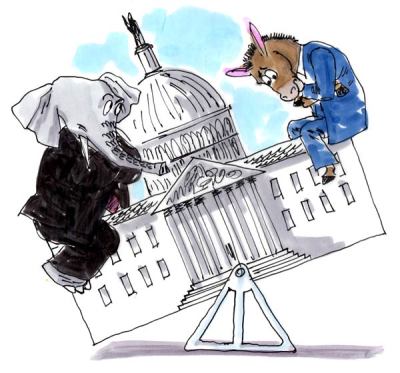5 Reasons Senate Control May Not Be Decided on Election Day

Think the Senate will be decided on Election Day, Nov. 4?
There are all sorts of reasons why you shouldn't, unless in the next seven weeks one side or the other — probably the Republicans — starts opening up a clear lead in enough races to give them a clear majority. If neither side does, control of the Senate could remain up in the air — for a while.
At the very least, political watchers are going to be in for a longer night than usual because one of the key races that is likely to determine control, Sen. Mark Begich's (D) reelection bid in Alaska, is taking place 4,000 miles and four time zones away from Washington, D.C. (and five in the Aleutian Islands). Load up on Red Bull and, if you can, hold the vodka.
Beyond that, though, the uncertainty could continue for much longer. The potential for overtime exists in two key states, and perhaps others, too, depending on how close the races are on Nov. 4. Beyond that, a close or even tied Senate will test the partisan loyalties of some members, including those who were elected with no party label at all.
With that, here are five plausible scenarios that might prevent us from definitively knowing who controls the Senate for days, weeks, or even months after Election Day.
1. A recount
In the HuffPost Pollster polling averages as of Wednesday afternoon, five races currently show the top two contenders separated by less than three percentage points: Alaska, Arkansas, Iowa, Kansas, and Louisiana. That does not include some other races that are hotly contested and could be very close at the end, like Colorado, Georgia, Kentucky, Michigan, New Hampshire, North Carolina, and maybe others.
What if one of these races is so close that the state election authorities cannot certify a winner without a recount?
In Minnesota six years ago, Sen. Al Franken (D) beat then-Sen. Norm Coleman (R) by 312 votes, a result that took so long to finalize that the state's second Senate seat was vacant until July of the following year. The dragged-out result deprived Democrats of the 60th vote they needed to cement their fleeting filibuster-proof Senate majority (the election of Republican Scott Brown in a Massachusetts special election the following January knocked the Democrats back down to 59 seats).
A recount/legal battle over a razor-thin Senate election could leave the Senate short a member when it organizes in early January. The side with more seats could organize the Senate under its control, but the eventual recount winner could flip control later in the session.
2. A runoff in Louisiana
Of all the possibilities discussed here, this one is the likeliest. Louisiana has an odd election system in which there is an all-party primary in November. Every candidate runs against one another on Election Day, and if no one gets over 50%, the top-two finishers advance to a runoff, which this year would be held more than a month after the general election on Saturday, Dec. 6. That also happens to be the same day as the Southeastern Conference college football championship game: If the LSU Tigers manage to make it, plenty of stories may be written about how football affected voter turnout.
If we had to bet right now, we'd say this race is likely to head to a runoff. In addition to Sen. Mary Landrieu (D) and Rep. Bill Cassidy (R), the candidates who would almost certainly advance to the runoff, there is a another notable Republican running, retired Air Force Col. Rob Maness. Maness won't finish ahead of Cassidy, but he'll get some votes (he's endorsed by Sarah Palin). Beyond these three candidates, the Louisiana Secretary of State's office lists four other Democrats, one other Republican, and a Libertarian. Presumably these candidates will all get at least a smattering of votes, further reducing the odds that either Landrieu or Cassidy can get to 50%.
3. Greg Orman's choice
Let's say, for the sake of argument, that there's not a result close enough to require a recount and there's no runoff in Louisiana. So we can put this election to bed, right? Well, not necessarily — because Greg Orman, the independent running against Sen. Pat Roberts (R) in Kansas, might actually win.
The Democratic candidate in Kansas, Chad Taylor, remains on the ballot, but he's trying to remove his name and, even if he can't, it should be clear to voters that he isn't really in the race. That leaves Orman as the de facto Democratic candidate, although it is not clear he would caucus with the Democrats.
Orman says that if one side has a clear majority, he will caucus with that party to increase his clout (and that of his state). That makes sense. But what if Republicans have just a 50-49 edge after Election Day, leaving both Republicans and Democrats short of their magic number for Senate control (51 for the Republicans and 50 for the Democrats because of Biden's tiebreaker)?
Orman would hold control of the Senate in his hand, and he might be able to extract big concessions out of the party caucus he chooses to join. For instance, he has said that Senate Majority Leader Harry Reid (D-NV) and Minority Leader Mitch McConnell (R-KY) are too partisan. Could he make the election of a new caucus leader a condition of his giving one side or the other control?
4. A runoff in Georgia
Like Louisiana, Georgia also requires winners to get over 50% to be elected to the Senate. In the Peach State's open seat contest, businessman David Perdue (R) appears to have a small lead over former nonprofit CEO Michelle Nunn (D), although Perdue is short of 50% in most polls. He may have a hard time getting there in part because of the presence of a Libertarian, Amanda Swafford, on the ballot.
A Libertarian candidate might also push Georgia's gubernatorial race between Gov. Nathan Deal (R) and state Sen. Jason Carter (D) to a runoff. What's odd here is that Senate and gubernatorial runoffs are held on different dates: The gubernatorial runoff is scheduled for Dec. 2, and the Senate runoff is scheduled for Jan. 6, 2015, which would be just after the 114th Congress convenes. That means the new Senate could come to order a member short, and that member could decide the majority, too, even assuming that the first three items on this list are resolved in an orderly way (all the other races have clean winners and Roberts is reelected).
5. A party switch
Beyond the choice of a potential Sen. Orman, it's not out of the realm of possibility that a current senator could switch parties. In a closely divided Senate, that could lead to a change of party control.
We saw this in 2001, a crazy year in the Senate. When the Senate opened that year on Jan. 3, control was split 50-50, but Vice President Al Gore (D) was still in office, which allowed Sen. Tom Daschle (D-SD) to serve as majority leader for 17 days. After President George W. Bush was inaugurated, Vice President Dick Cheney's (R) tiebreaking vote made Sen. Trent Lott (R-MS) majority leader. Later that year, Sen. Jim Jeffords (VT) announced he was switching from Republican to independent and would caucus with Democrats, which made Daschle majority leader again. Republicans re-took the chamber in the 2002 elections.
Who could switch this time? The most obvious candidate would be independent Sen. Angus King (ME), who currently caucuses with the Democrats. He's left the door open to a post-election caucus switch.
A longer shot would be someone like Sen. Joe Manchin (D-WV), one of the more conservative members of the Democratic caucus. It's possible that after this election, he will be the only Democrat in the Mountain State's congressional delegation, and it's also possible that his state's House of Delegates (the lower chamber of the state legislature) will flip to the Republicans for the first time since 1928. Additionally, we've heard rumblings that Manchin's own numbers are not as strong as they used to be, and he might sense the political winds shifting in his state as he eyes a reelection bid in 2018 — or a return to the governor's office in 2016.
One longtime West Virginia observer said that the chances of a Manchin party switch were remote but added, "Manchin changes with the wind."
Perhaps other senators could be induced to flip sides, though those changes might not necessarily change the majority party. One possibility if the Republicans win a clear majority (something like 52 or more seats) is that their edge may grow as someone like King decides life is better in the majority. In 1994, Republicans won a 52-seat majority that increased to 54 seats after Sen. Richard Shelby (AL) and then-Sen. Ben Nighthorse Campbell (CO) switched from the Democrats to the Republicans. This is all the more incentive — the good Democratic Senate map coming in 2016 is another — for Republicans to think of their Senate goal as more than just 51 seats.
Conclusion
The general public is probably getting sick of this election because they hate Congress and they would rather watch cereal commercials than political ads. The political class is getting sick of this election because it distracts from Hillarymania and the Republican presidential jumble.
There are many who want this election over and done with on Nov. 4. But they may not get their wish.




























